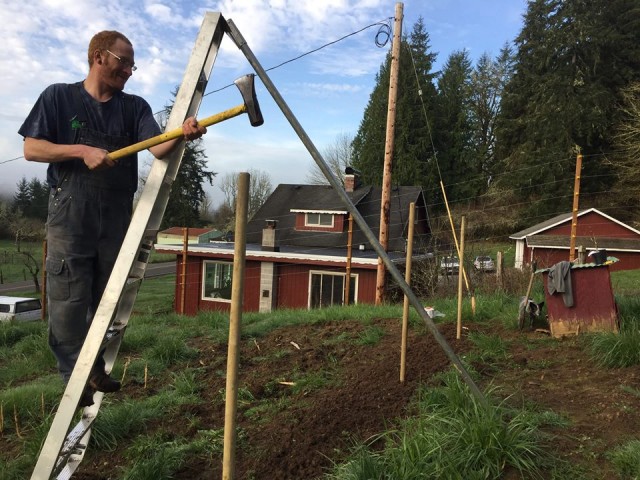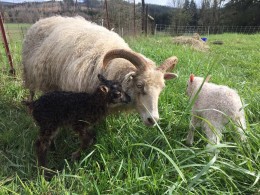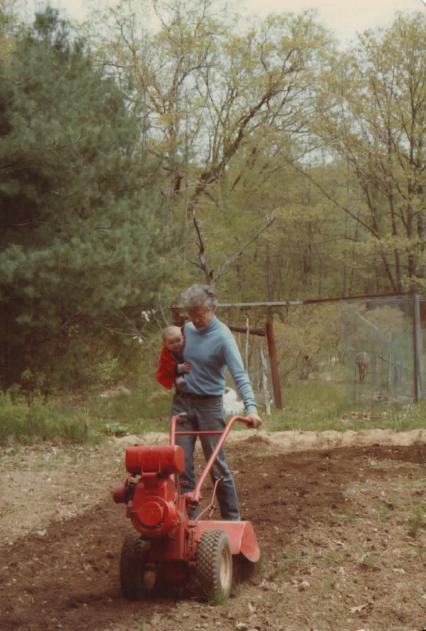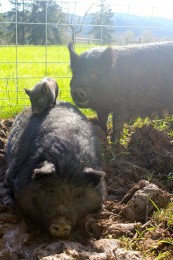How A Farmer In The Pacific Northwest Does Money

Addie is a landowner in her early thirties with whom I went to school back in the day who describes herself as a “a passionate advocate for, and producer of, local food, committed to building the communities and policies that small and beginning farmers needs to succeed.”
Good morning, Addie! Can you introduce yourself, say a little bit about who you are and what you do? Perhaps you could start by explaining how I ended up with a picture of a pig’s heart on my fridge for several years. (Definitely the best Valentine’s Day card I’ve ever gotten.)
Ok, so I feel like going to Swarthmore, we were really released into the world believing that we were the best and the brightest and that the world would fall down on its knees before us to offer us the career of our dreams. Needless to say, that was not my experience when I left the Swat bubble. On the contrary, arriving in Seattle, it became readily apparent to me that I had very few marketable skills, other than the ability to type pretty fast.
I launched on a quest to gain as many “practical” skills as I could. I worked for several years doing habitat restoration and trail building, for the WA Dept of Natural Resources, and the Nat’l park Service. What I discovered is that I loved working with my hands and having something to show for myself at the end of the day.
Circa 2008, I started getting really interested in local food and food issues (as was the rest of the world), I subscribed to my first CSA Box, started reading Michael Pollan, etc. At the same time, we were in an economic depression, the Nat’l Park Service was losing funding for trails positions, and in 2010, I lost my position at Mt. Rainier National park. I decided to seize the opportunity to go work on a farm.
Justin was finishing up school at that time, and so the two of us took an apprenticeship at Rosehip Farm and Garden, on Whidbey Island, which is North of Seattle. After nine months of the apprenticeship, we felt like we had enough know how to launch a farming venture of our own, but we didn’t feel ready to buy our own land. We found a family, through a state program called FarmLink, that had 30 acres they wanted to turn into a market garden. They were willing to let us live on their land in exchange for our help converting it into a productive farm. So we moved down there, built a yurt, and worked our butts off for a year. At the end of the year, unfortunately, the couple who owned the farm decided to get a divorce and sell the farm. So we had to leave in a hurry, which was really hard and sad, after all that we had invested there.
We ended up moving to Olympia, to live and farm with a friend of ours. The land was owned by a collective, and so we lived with about 8 other people, and the three of us operated a market garden. We had a CSA, sold at a local farmers market, and sold to some restaurants. It was a great season, but unfortunately, we a) made no money, and b) did not have the support of the community that owned the land. At the end of the season, it became clear that the community was not going to support us having a farm there again. It’s complicated, but long story short, Justin and I decided that we were ready to start looking for our own place. We fell in love with the first place we saw, and by late 2012 we had closed on 40 acres of paradise.
Moving to our new place, we decided that really didn’t want to grow vegetables for market anymore. It’s really hard work, and it’s really difficult to make a living, doing it at the scale that we enjoyed doing it. We’ve focused instead on raising livestock (sheep and pigs and chickens, and a few ducks for a while), planting an orchard and other perennials like blueberries, and investing in the infrastructure we need to be successful (lots and lots of fencing, a barn eventually, a pond, etc). I continue to keep a huge garden where I grow most of our food, and I preserve a lot.
If we can make our money doing other work we love, than there’s much less pressure to make money from farming. And that’s really nice.
The other thing that’s happened is that we are both increasingly invested in our off-farm work. Justin is now the production manager at a company that turns reclaimed lumber into beautiful furniture. I’m working for a nonprofit land trust and working on my MPA, and I intend to continue working in the world of conservation. So it feels like, if we can make our money doing other work we love, than there’s much less pressure to make money from farming. And that’s really nice. It’s nice to be able to just enjoy the land, and do it for fun, without the pressure of turning a profit.
Also in the last couple years, I’ve gotten pretty involved in community organizing around our local food systems. I serve on the board of a local farmers market, as well as on the board of statewide org. that does advocacy and education for organic growers. That work has been really important in connecting me to community, and making me feel like I have an impact beyond just the envelope of my farm.
So you have had a really eventful and interesting seven years. You also got married somewhere in there, right?
Yup! We got legally married at a courthouse wedding in 2012, and then we had a big community celebration on the land in the summer of 2013. That celebration was focused not just on our commitment to each other, but on our shared commitment to the land and to being the best stewards of the land we possibly can.
When you look back on this period, what would you say are some of the triumphs that stand out to you, in terms of what you’ve been able to accomplish? Have you surprised yourself / each other?
That’s a great question. Farming is all about trial and error, making it up as you go along. You can read stuff in books, but things never happen exactly by the book. So I think one of the greatest triumphs has been really giving myself an education and then converting that knowledge into practice. A great example from really recently: we have a small flock of Icelandic sheep — three ewes and a ram. Right now is lambing season, and we are expecting lambs from all three of our ewes. About a week ago, the biggest of the ewes went into the labor.
I had read in my “Guide to Raising Sheep” all about the potential complications that can ensue during labor, but I also just sort of assumed that everything was fine. During this labor, the first lamb was stillborn — it was dead by the time I found them. The ewe quickly presented with the second lamb, but it was presenting with just one leg forward. The lambs need to have both feet forward in order to come out of the birth canal. The only thing to do in this case is to a) call a vet or b) try to reposition the lamb yourself. I knew I didn’t have time to call a vet, the ewe was already in distress, so I had to reach in there and find the other leg, and bring it forward, and then, because it was so big, tug and twist and pull the poor little lamb out of her. And I did, and it lived, and she ended up having a third lamb as well.

Addie has some little lambs
That was a real triumph: trusting myself to apply some book learning to a tough and stressful situation. And I’d say that characterizes a lot of my farming experience. Not all situations are that life-and-death, but there are always unknowns and stressors that complicate the situation.
Yeah! Wow. Did you read the Jane Smiley book from last year following the lives of various members of an Iowa farming family through the 20th century? There’s a quote from the beginning of it that really stuck with me: “If anyone remembered that rearing a child on a farm was dangerous, it was Rosanna. … What she did know was that some farmers understood that the death of someone around the farm, often a child, was the price of farming.”
Wow — no, I missed that one. I’ll have to check it out. It’s true, though. I’ve heard people say that you’re not a farmer until you start losing animals.
Bearing that in mind, did your family worry about you at all when you chose this path? About the emotional and physical strains, not to mention the financial anxieties? Not that you haven’t seemed to deal well with all of them so far. But it’s a challenging life, especially perhaps if you weren’t born to it.
I’m lucky in that my family has been incredibly supportive of my passions and path in life, even as my path continues to meander. I’m sure they worried about me. My mother has cautioned me about the incidences of accidents, etc, in the world of farming. But for the most part, they are right there with me to celebrate all the small successes and wonders of it.
I wasn’t born into farming, but I think my parents did work hard to instill in me a love of the outdoors and of growing food. I have a photograph I can send you of my father roto-tilling the garden with me, as an infant, on his hip (talk about danger!). Once, I was chatting with him about hobbies, and he said to me, “I don’t have any hobbies!”. And I said, “but what about gardening?”. And he responded, “I don’t garden because I like to garden, I garden because it’s just what we’ve always done in my family.” So there’s a way in which I feel like I’ve carried that forward. It’s just what we’ve always done.

Picture of the author and her father
Were your parents at all concerned about the financial aspect of it? Like, how is our daughter going to make a living off of the land? And did you think a lot about that part before venturing in?
It wasn’t something I worried about before I started farming. When I started farming, there was this sense of urgency about it, as if it was the only thing I could possibly do, regardless of the consequences. I’m a little bit more measured about it now. And I have a much more realistic picture of what it takes to make a living doing it. I think if my parents were worried about me making a living doing it, they generously withheld those concerns from me.
Like good parents everywhere. Have you and Justin been on the same page about these decisions, more or less?
Definitely. Everything is a negotiation, right? And one of things that I appreciate about farming with Justin is that it is this shared project, this enormous thing that we have in common and that binds us together no matter what. I think a lot of couples in the world don’t necessarily have that, except for their children, which become their shared project. For us, the land is a manifestation of our connection to each other.
That’s really lovely and makes a lot of sense. I take it the land feels like a worthwhile investment, then? Are there any kinds of livestock or equipment that you’ve regretted buying / having to buy?
The land is definitely a worthwhile investment. It is a life-long project. I like getting to think about what it will be like in 30 or 40 years.
I don’t know that I necessarily have any regrets about the livestock or equipment we’ve had to buy . . . even when it hasn’t worked out, it’s been a learning experience. For example, we bought some ducks last year because we wanted to put them in our pond, and we wanted the eggs. They were really cute for a while, until they started getting out into the road. One of them got hit by a car and died.
We ended up deciding they weren’t right for us. But we couldn’t know that without having the experience. We get to make lots of choices, but lots of those choices can also be undone. And I see that with other farmer friends of mine. They decide to try a certain thing, an animal or a project, and if it isn’t working out after a couple of years, they let it go. It’s just what you have to do. And then you hold that knowledge and can share it with someone else.
Has anything been a particularly expensive learning experience?
Well, we recently made the hard but ultimately smart decision to stop raising pigs for a while. There were a lot of factors behind that decision, not least of which is that I really want to go on vacation! The pigs were much harder on the land than we would like, and we just realized we didn’t have the infrastructure in place to really do it right (like a decent barn). But we invested a lot in the project: the animals themselves, the feed, the fencing, building shelters for them. We generated a small return on it, but not enough to justify keeping doing it.

Oink
Your wedding should have come with a barn raising! Summon your friends back there and make them do it right.
Right! Maybe someone else can have a barn raising wedding on our farm 🙂
How far in the future do you and Justin plan? Do you think about retirement, for example?
We definitely plan for the future, but it’s in sort of a vague way. It’s really hard to know what the future will bring. Is that trite, or what? I think maybe we envision more than actually plan. We do talk about retirement, and planning for a time when we don’t need to have off-farm jobs, and can really sustain ourselves on the land. Right now the general idea is to keep working off farm in order to raise the capital we need to continue investing in infrastructure, so that when we are ready to retire from off-farm work, we have everything in place we need to be really successful. But it doesn’t feel realistic to think that we can make enough money farming in order to retire and not work at all. If that makes sense.
It does. Does part of you wish you had a typical office job with a 401(K)?
There are things that I miss about working in a conventional setting, but a 401K isn’t at the top of the list. What I miss the most right now is actually having coworkers! I mostly work from home in my capacity with the land trust, and it can be lonely. And farming is lonely. I definitely haven’t ruled out going back to work in an office full-time. So if I do, I will let you know how I feel about it.
Thank you! And thank you for taking the time to chat with me about this. Lots of luck going forward! And please send us all more valentines featuring pig hearts.
Support The Billfold
The Billfold continues to exist thanks to support from our readers. Help us continue to do our work by making a monthly pledge on Patreon or a one-time-only contribution through PayPal.
Comments